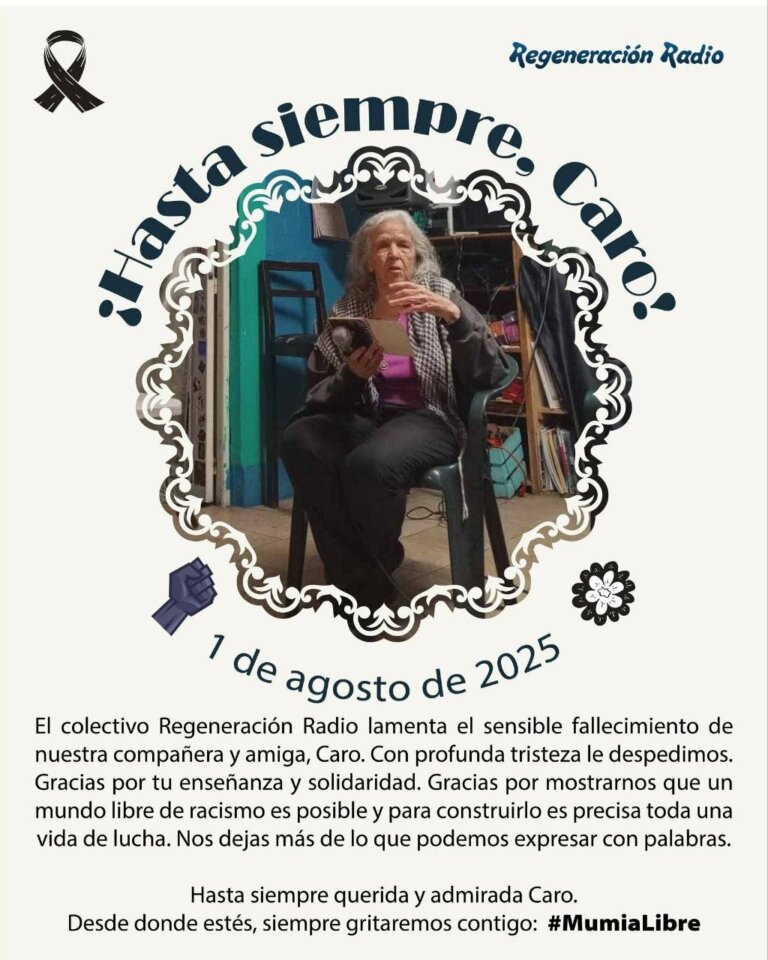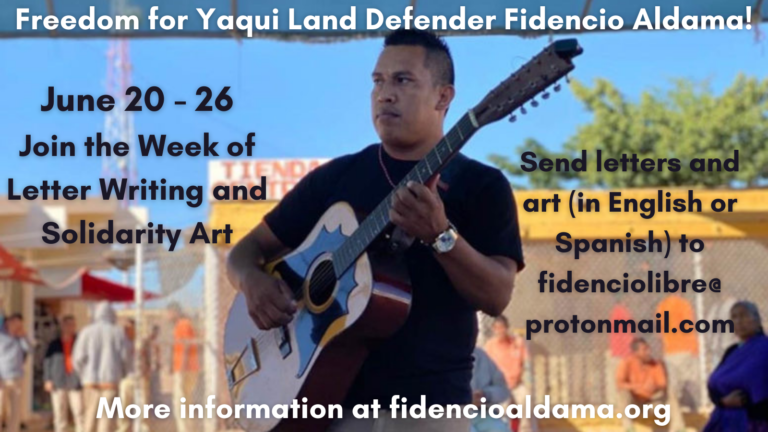x carolina
Sky-rockets blast off. Machetes gleam. Atenco is in town to head up a march from the Independence Angel to the Mexico City Zocalo. More than a thousand people join in. Chants ring out: Atenco lives! The struggle continues!
The march brings two days of activities to a close –– activities organized by the Peoples’ Front in Defense of the Land (FPDT) to mark the brutal repression of May 3 – 4, 2006, in San Salvador Atenco and Texcoco, where a struggle in support of local flower vendors was in full swing. The aim of the police terror, incited by the news media, was to punish campesinos who had succeeded in stopping the most important project of the Vicente Fox administration in 2002 ––an airport that would have robbed them of their lands.
Just a few days before, in a visit to the town of Atenco, Subcomandante Marcos of the EZLN had said: “We’ve come to recognize you as our older brothers because you’ve shown us how to defy the powerful, confront them, and with our own hands, defend what they want to take from us: land, liberty and life. This noble land of Atenco has much to teach, not only to us as Zaptatistas, but to all people in struggle.”
This is why so many groups and organizations all over the country have invited the Atenco comrades to visit their communities and explain how they were able to defeat Fox’s number one project. And when solidarity is called for, Atenco is always there.

A voice comes over the sound truck:
“Let no one forget the invasion of 3,500 state and federal police in our town, the violent house searches, the bloody beatings, the murders of young Alexis Benhumea and Javier Cortés, the arrests of 207 comrades, and the sexual torture of at least 26 women, 11 of whom have brought international court action against the State”.
The Red May repression was ordered by then Governor of the State of Mexico, Enrique Peña Nieto, now President of the country. He’s proud of it. He brags about it. That repression is cloaked in impunity.
“But even with everything they did to us, we don’t come here today as martyrs. We don’t come to cry. We’re now facing a new effort to dispossess us of our lands, a new plan to build an airport on our territory. And we’ve come here to say NO to Enrique Peña Nieto’s airport. NO to this death project. And NO to the new Eruviel Law, enacted by State of Mexico governor Eruviel Ávila, to legalize repression,” says América del Valle.
The same thing was said at the cultural event the day before in Atenco. When we were assaulted by the horrendous noise of an adjacent event organized by the local PRI government, obviously designed to ruin our activity, we went right ahead with our program, urged on by Cayo Vicente’s fiery music, a spontaneous march with machetes held high led by Alicia, jokes told by Mastuerzo, and the danceable sounds of the Mexican Sound System. “They want to see us sad and disheartened,” said Gabo Revueltas, “but let’s not give them that satisfaction! Dancing is resistance, too!” And we danced.

Different contingents of peoples, students and workers join the march. Banners and posters bear the names of Ayotzinapa, Xochicuautla, Coyotepec and Zapatista collectives. There’s also a banner in support of the San Quintin day laborerers with a call to boycott the Driscoll company. A comrade says a few words over the loud speaker about that situation.

In the march we run into old and new friends, including comrades who were always present in the actions to free the Atenco political prisoners. And thanks to a constant struggle with national and international support, they all walked free. Even when Ignacio del Valle and Felipe Álvarez were sentenced to spend the rest of their lives in prison, they got out in four years, at the same time politically pursued people were able to come home.
When the march passes by the monument to the 43 disappeared Ayotzinapa students, the FPDT takes a moment to express solidarity with the parents. They chant “They took them away alive. We want them back alive!”
In the Zócalo, a call goes out to support resistance to the incursions of the Mexican Army and construction companies trying to take machinery and materials into the lands of the peoples of Atenco and Texcoco. The FPDT Atenco blog reports that just a few days ago in the community of Tocuila, it was necessary to expel the invaders and burn some of their materials for the construction of the Pyramids–Texcoco Toll Road, which is part of the airport project. And the next day, campesinos dug ditches to divert a stream of water and flood their lands in order to prevent more incursions.
Felipe Álvarez notes that all the communities have protective orders against the construction, but these have not been respected. “The news media smear us as rabble rousers,” he says, “but we have the right to defend our lands and that’s what we’re going to do.”
A comrade with years of experience speaks to us. She’s 86 years old. “We don’t want that airport and we don’t want so many streets….The President of Atenco is handing out money to buy people’s votes, but that’s not going to save him….We won 15 years ago and we’re going to win now….Why do we need so many highways? We’re just fine the way we are. If they build a highway here, where are we going to walk? This is a town, not a city. Let us live the way we want to. Peña Nieto has lots of money. Apparently, he’s well off….We don’t have money, but we know how to defend what’s ours.”

Two comrades from the town of Xochicuautla recall the state terror in Atenco in 2006. They tell how they, too, have been dispossessed of their lands and repressed, just like people in Chiapas, Guerrero, Ostula and so many other places. Together with other peoples, they’re getting organized in the National Campaign in Defense of Mother Earth and the Territories. We have to join together, they say. “NO to the ‘Eruviel law’!”
A comrade from Tocuila reports that the construction company continues to send people to try to invade their lands and introduce machinery and materials. As a strategy to be able to keep up resistance, the people of Tocuila have decided to plant trees. They ask our help. “To confront this death project, give us a piece of life,” says the comrade. “Donate a tree.”
“Today we know we’re not alone,” says Trinidad Ramerez of the FPDT. “We’re not going to lose this struggle if the students, teachers and everyone else are with us.”




